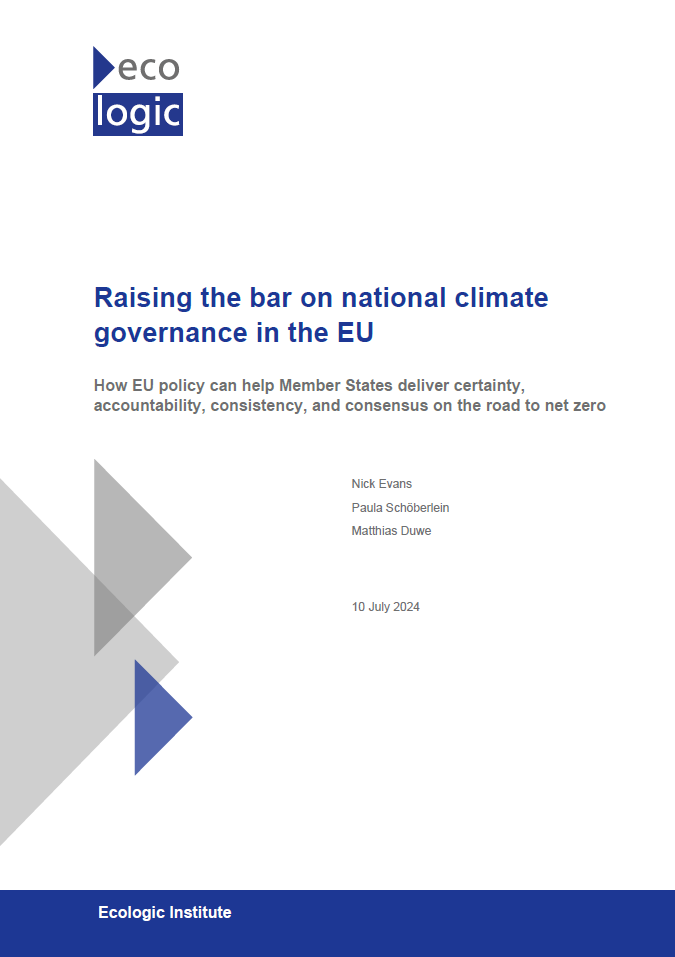Raising the Bar on National Climate Governance in the EU
How EU policy can help Member States deliver certainty, accountability, consistency, and consensus on the road to net zero
- Publication
- Citation
Evans, Nick, Paula Schöberlein, Matthias Duwe (2024). Raising the bar on national climate governance in the EU: How EU policy can help Member States deliver certainty, accountability, consensus, and consistency on the road to net zero. Ecologic Institute: Berlin.
The European Union's goal of achieving climate neutrality by 2050 hinges on the decisions made by its Member States. Strong national governance frameworks are crucial for guiding policy-making, gaining societal and political support, ensuring effective implementation, and holding governments accountable.
Effective climate governance employs procedural safeguards to maintain consistent and unified action towards climate neutrality. These safeguards ensure: certainty in the pace and direction of the transition, accountability for commitments made, consistency across different sectors and over time, and consensus among state and private actors.
With these four benefits of strong climate governance as a lens, this report offers a comparative assessment of the tools, institutions, and procedures used by national governments across the EU27 to make climate policy decisions, revealing common strengths and weaknesses. On this basis, the analysis then identifies specific EU-level policy options to ‘level up’ and improve national practices.
Main weaknesses in national climate governance frameworks in the EU27
- The assessment reveals significant regional differences in policy-making institutions and procedures. This is evidence for a ‘two-track’ EU on climate policy management.
- By setting a date for climate neutrality, many Member States have provided certainty on the transition. However, full clarity on net zero in national contexts is missing due to reliance on removals, lack of sectoral differentiation in targets, and insufficient strategic planning.
- Robust accountability mechanisms are underdeveloped at the national level, despite EU reporting obligations, and institutionalised independent scientific advice and oversight are missing in many Member States.
- Coordination and mainstreaming provisions to enhance policy consistency exist on paper, but their effectiveness in practice is questionable. A concern is the alignment between short- and long-term climate policy planning.
- National systems do not always ensure early, frequent, and effective participation in climate policy decisions and planning, risking failure to deliver consensus and societal buy-in to climate action.
EU policy options to help address existing governance weaknesses and gaps
Enhancing national certainty about the transition to climate neutrality
- Binding national long-term carbon dioxide removals (CDR) targets
- Enhanced LTS mandatory content requirements,
- Regular 5-year full updates to the EU LTS and more frequent 2- to 3-year updating of underlying modelling
Increasing national accountability for long-term climate action
- Reinforce the ESR compliance mechanism
- Introduce a dedicated indicator-based transition monitoring system
- Strengthen monitoring and action trigger in EU Climate Law.
- Mandatory review/input for national climate planning
Ensuring the net-zero consistency of national policies across sectors and over time
- Required country-specific recommendations following the EU Climate Law consistency assessment
- Full integration of long-term strategy (LTS) and national energy and climate plan (NECP) processes
Fostering consensus & societal buy-in to a vision for & action on net zero
- Concerted effort to improve mandatory and permanent multi-level climate and energy dialogues.
Policy reforms that could deliver across all four benefits
- Introduction of cross-compliance mechanisms, i.e., making EU funding conditional on sufficiently detailed, timely delivery
- Additional EU funding and capacity building support for national institutions to deliver on EU requirements




